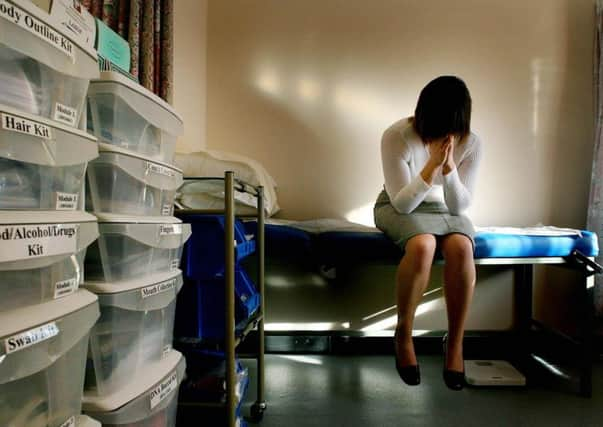Charity expects more rape survivors to seek justice through civil courts


Sandy Brindley, chief executive of Rape Crisis Scotland, said she expected more and more women to “turn to the civil system” amid frustration at the historically low conviction rate for such offences in the criminal justice system.
It comes amid a landmark case currently going through the courts, where a woman is taking civil action against a man who was cleared of raping her following a High Court trial.
Advertisement
Hide AdAdvertisement
Hide AdThe woman, known as Miss M, has brought a civil case against Stephen Coxen for personal injury. Mr Coxen had been charged with raping the woman, a former student at the University of St Andrews, at her flat while she was intoxicated during freshers’ week five years ago.
In November 2015, a jury at the High Court in Glasgow found the case against him not proven, a verdict which has the same effect in law as not guilty.
Miss M’s civil action is believed to be the first time since 1926 that a woman has launched a civil action in Scotland after an unsuccessful rape prosecution.
Last January, Denise Clair from Livingston brought a successful civil action against former Scotland international footballer, David Goodwillie, and his ex-Dundee United colleague, David Robertson.
At the Court of Session in Edinburgh, judge Lord Armstrong ruled the two men had raped her and ordered them to pay £100,000 in damages. Ms Clair took the action after the Crown Office decided against a prosecution.
Ms Brindley said that case, coupled with Miss M’s ongoing action, has raised awareness of the civil courts avenue. Her organisation has been contacted of late by several women who are considering mounting their own civil actions.
She described the number as a “handful,” but stressed: “It’s not going to be a huge amount of women, but I have no doubt this is not going to be the last civil case that we’ll see.”
She added: “There are a lot of people who feel very let down by the criminal justice system, and I think the fact there is now going to be a second civil case in as many years will make other rape survivors view it as an option to get some form of justice.
Advertisement
Hide AdAdvertisement
Hide Ad“I think we will see more people turning to the civil system. It’s not for everyone and it’s not an easy process, but at least it’s a chance for justice who feel they’ve been let down by the criminal system.”
In the latest case, which is due to begin next month, Miss M has mounted an action Edinburgh Sheriff Court, and is seeking just under £100,000 in damages and financial losses.
She has received funding to cover her costs by the Scottish Legal Aid Board as well as the Scottish Women’s Rights Centre and Rape Crisis Scotland.
In an interview with the BBC, Miss M said yesterday that she was not looking for financial gain, but justice.
“I feel that the criminal case did fail me and I hope that through this a spotlight will be shone on the process,” she said. “Hopefully the civil route will get some justice for me and my family.
“For me it has never been about the money. It is the only route I have left. It is an extremely difficult process to go through.
“I did think after the criminal trial that I wouldn’t be able to continue and carry on into another avenue of legal proceedings but I wasn’t ready to give up.”
She added: “I don’t want to look back in 20 years and realise I could have gone down a different route. I want to do all I can do at the moment.”
Advertisement
Hide AdAdvertisement
Hide AdMr Coxen’s lawyers, Thorley Stephenson in Edinburgh, confirmed he would be defending the action but declined to comment further.
There are no official statistics recorded as to the number of such civil actions raised, pending or otherwise, although the Law Society of Scotland has said many civil cases end in settlement before they reach court.
Whereas criminal cases must be proved “beyond reasonable doubt,” the burden of proof is lower in civil matters, and must be proved “on the balance of probabilities,” meaning that the court needs to believe it is more likely than not that the person behaved in the manner alleged.
However, organisations who offer support and guidance to rape survivors point out that there are numerous hurdles which may prevent women from going down the civil route.
In order to grant funding, the Scottish Legal Aid Board must not only scrutinise an applicant’s financial means, but whether they have “probable cause” - a test, in other words, of whether their action will be successful or not.
The Scottish Women’s Rights Centre points out that as things stand, survivors of rape who bring civil damages case may be cross-examined by the defender if he decides to represent himself, while Ms Brindley said that those bringing civil actions have no guarantee of anonymity.
“In the case of Denise Clair, she waived her right to anonymity because there was no guarantee of it,” she explained. “It gave her some control over the process. But there are so many complainers who would not be able to do that and it is a real barrier.
“If we are going to see more women turning to the civil system, we need to look at what protections are put in place, like a prohibition on cross-examination, and anonymity ”